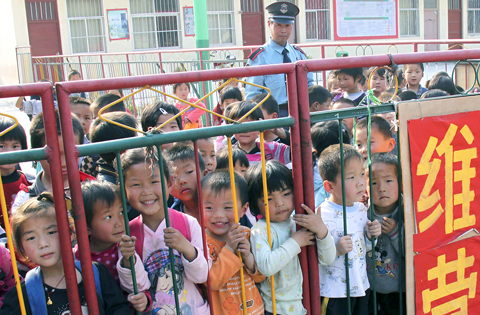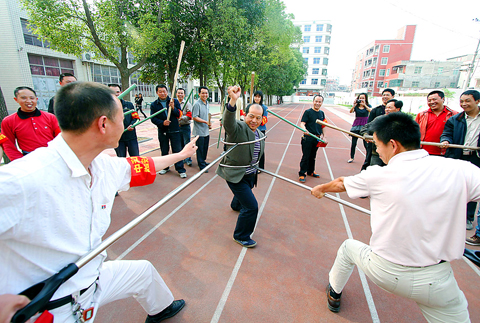Villagers thought him gentle and kind; and one generous act stood out above the rest. In his 20s, Wu Huanming (吳煥明) took in a young disabled boy he found on the streets.
“The child was always warmly and newly dressed. Any time he caught a cold, Wu would rush him to the doctor. He took great care of him, but when people asked why, he just said the kid brought him luck,” a neighbor said.
On Wednesday morning, however, the tender-hearted man hacked to death seven kindergarten pupils, their teacher and her mother, wounding 11 more three to six-year-olds.

PHOTO: REUTERS
The assault in Lincheng village, Hanzhong, Shaanxi Province, would horrify any community. It is all the more shocking because it is China’s fifth such attack on young children since late March. In all, 15 have been killed and 60 injured.
That this attacker was successful and well-liked makes it all the more incomprehensible.
That many of his victims were their parents’ only children, thanks to China’s birth control policies, underscores its cruelty. In minutes, he destroyed the center of his friends’ and neighbors’ lives.

PHOTO: AFP
“They were so young and innocent,” one shocked mother said as her “active, outgoing” daughter lay unconscious on a hospital bed.
“We still don’t know how serious the injuries are and fear she will suffer lasting trauma. How will she be able to spend the rest of her life?” she asked.
Wu knew the little girl, as he did many of his victims; the family considered him a friend and he often dropped in to chat. Now they feel only hatred.
“If he were still alive, we would all have used our knives to hack at him, one by one, until he too was dead,” her grandmother said.
The trigger for his violence appears banal: a property dispute. Wu, 48, had rented a house to the kindergarten and wanted it to move out when the lease expired last month. Wu Hongying (吳宏英), the teacher, wanted to stay until summer.
The disagreement erupted into an open row this week. Too scared to intervene, neighbors shut their doors when Wu ran back to his house and grabbed a meat cleaver.
Tall and powerfully built, he quickly overcame the 50-year-old teacher and attacked her 80-year-old mother.
Then, raining blow after blow upon their heads, he wounded or killed every child attending class that day. Most seem to have been rooted to the spot in shock. One little boy, despite his injuries, escaped to raise the alarm.
Villagers said their legs buckled when they entered the blood-soaked kindergarten room. Children lay motionless upon or underneath desks. Another was slumped by the door, with a long, 3cm wide wound across her scalp.
By then, Wu had returned home. His cousin has reported seeing the killer standing on his balcony, smoking a cigarette as he watched villagers rush to rescue the children. Then he went inside and killed himself. Officials have responded to the epidemic of violence in China with high-profile security measures.
In Changsha, Hunan Province, police officers with submachine guns are reportedly guarding some kindergartens. Chongqing has pledged to spend 1.2 billion yuan (US$175.7 million) on extra police patrols and security guards.
Hanzhong had stationed 2,000 extra police officers and guards around the city’s schools two days before Wu’s attack; the kindergarten, small and privately run, appears to have been unprotected.
Police have since set up roadblocks around the village and residents reported patrols through the night.
There is a heavy police presence outside the hospitals treating injured children.
Some journalists in the area were followed or stopped and relatives said they had been ordered not to speak to reporters. Though some talked to the Guardian, none would be identified.
At one hospital, an official interrupted a man’s description of his grandson with the order: “Don’t tell them anything.”
Domestic media coverage relating to recent attacks has given minimal detail of incidents, instead focusing on preventive measures.
There is undoubtedly real concern that reports will spark further copycat assaults, but many experts argue that must be balanced with the public’s right to know; several Hanzhong residents were unaware of the recent attacks. Others believe more open discussion would help to ensure security measures are matched by efforts to address underlying causes.
“It’s not that [China’s leaders] are immune or unconcerned or not in anguish. I think it has to do with trying to figure out what they need to do about it,” said Russell Leigh Moses, a Beijing-based political analyst, of the government’s focus on protecting schools.
Some experts have pointed to the desperate need to improve awareness of and treatment for mental illness in China. Others warn that rocketing inequality, allied to massive social change, is leaving many citizens bewildered and alienated.
However, though Lincheng is poor — many from the village become migrant workers, with several parents traveling hundreds of kilometers to their children’s bedsides this week — Wu was one of Lincheng’s wealthiest residents. Unlike other recent attackers, portrayed as unsuccessful loners, the tree merchant had a wife and family; his biological son is now a university student.
Last month he told a villager that he had become ill and could no longer work; there are rumors he had cancer and believed it terminal.
He had complained of sleeplessness and a relative told reporters that he had been “talking nonsense ... like he was unbalanced.”
He had no history of mental problems. Perhaps there are no real explanations for Wu’s act.
At one hospital, red-eyed parents leaped to their feet for a glimpse as orderlies pushed three victims from surgery to intensive care.
The children’s heads, though doubled in size by thick bandages, were tiny upon the pillows. A little hand fell limply from beneath a blanket.
The suffering of children brings anguish anywhere, but in China, they are particularly precious because of the importance of continuing family lines, experts said.
“Children are the most important part of the family because the one-child policy is so strict these days,” one survivor’s grandmother said.
In Lincheng, family planning injunctions are painted upon the walls.
One includes the government promise: “Children will be happy all their lives.”

‘TERRORIST ATTACK’: The convoy of Brigadier General Hamdi Shukri resulted in the ‘martyrdom of five of our armed forces,’ the Presidential Leadership Council said A blast targeting the convoy of a Saudi Arabian-backed armed group killed five in Yemen’s southern city of Aden and injured the commander of the government-allied unit, officials said on Wednesday. “The treacherous terrorist attack targeting the convoy of Brigadier General Hamdi Shukri, commander of the Second Giants Brigade, resulted in the martyrdom of five of our armed forces heroes and the injury of three others,” Yemen’s Saudi Arabia-backed Presidential Leadership Council said in a statement published by Yemeni news agency Saba. A security source told reporters that a car bomb on the side of the road in the Ja’awla area in

PRECARIOUS RELATIONS: Commentators in Saudi Arabia accuse the UAE of growing too bold, backing forces at odds with Saudi interests in various conflicts A Saudi Arabian media campaign targeting the United Arab Emirates (UAE) has deepened the Gulf’s worst row in years, stoking fears of a damaging fall-out in the financial heart of the Middle East. Fiery accusations of rights abuses and betrayal have circulated for weeks in state-run and social media after a brief conflict in Yemen, where Saudi airstrikes quelled an offensive by UAE-backed separatists. The United Arab Emirates is “investing in chaos and supporting secessionists” from Libya to Yemen and the Horn of Africa, Saudi Arabia’s al-Ekhbariya TV charged in a report this week. Such invective has been unheard of

US President Donald Trump on Saturday warned Canada that if it concludes a trade deal with China, he would impose a 100 percent tariff on all goods coming over the border. Relations between the US and its northern neighbor have been rocky since Trump returned to the White House a year ago, with spats over trade and Canadian Prime Minister Mark Carney decrying a “rupture” in the US-led global order. During a visit to Beijing earlier this month, Carney hailed a “new strategic partnership” with China that resulted in a “preliminary, but landmark trade agreement” to reduce tariffs — but

SCAM CLAMPDOWN: About 130 South Korean scam suspects have been sent home since October last year, and 60 more are still waiting for repatriation Dozens of South Koreans allegedly involved in online scams in Cambodia were yesterday returned to South Korea to face investigations in what was the largest group repatriation of Korean criminal suspects from abroad. The 73 South Korean suspects allegedly scammed fellow Koreans out of 48.6 billion won (US$33 million), South Korea said. Upon arrival in South Korea’s Incheon International Airport aboard a chartered plane, the suspects — 65 men and eight women — were sent to police stations. Local TV footage showed the suspects, in handcuffs and wearing masks, being escorted by police officers and boarding buses. They were among about 260 South